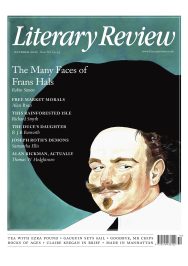Hilary Davies
Whispers of Immortality
The Gloucester Notebook
By T S Eliot (Edited by Robert Hyde)
Galileo Publishers 171pp £25
The Waste Land: A Biography of a Poem
By Matthew Hollis
Faber & Faber 524pp £25
Eliot After The Waste Land
By Robert Crawford
Jonathan Cape 609pp £25
This October marks the centenary of the publication of arguably the most influential poem written in English in the 20th century. At its appearance, The Waste Land polarised critical opinion: ‘a grunt would serve equally well’, ‘a thing of bitterness and beauty’, ‘a pompous parade of erudition’, ‘one of the most moving and original poems of our time’. In the end, time would agree with this last assessment.
The anniversary was inevitably going to be the occasion of revisits, reappraisals and revisions, despite the already dense forest of Eliot scholarship. Is there more to be discovered? Robert Hyde, Matthew Hollis and Robert Crawford clearly think so, and these three books neatly cover virtually the full span of Eliot’s creative career.
The Gloucester Notebook is a facsimile edition of a manuscript notebook that the youthful Eliot entitled ‘Inventions of the March Hare’. It contains the earliest extant copies of poems he wrote at the moment of his formative encounter with the work of the French poet Jules Laforgue, and reveals how his style changed at that point. The notebook is also important because it contains the first version of ‘The Love Song of J. Alfred Prufrock’, the poem in which Eliot’s distinctive voice establishes itself over and against the writings of the Georgians, which were anathema to him and Ezra Pound. In this poem we hear for the first time whispers of The Waste Land.
Robert McCrum’s foreword rightly stresses the significance to Eliot of Gloucester, Massachusetts: his father owned a large holiday home right on the seashore at the edge of this fishing city, and here the family would escape the industrial pollution of St Louis each summer. Eliot’s boyhood experiences of the sea, sailing and the tales of the local fishermen haunted his imagination far into his mature work, most memorably in ‘Marina’ and ‘The Dry Salvages’.
So there is no doubt of the importance of this text in understanding Eliot’s development. But in other respects it is difficult to know whom the volume is for. It does not comprise all the poems found in the original (some were too scatological and removed by Eliot),

Sign Up to our newsletter
Receive free articles, highlights from the archive, news, details of prizes, and much more.@Lit_Review
Follow Literary Review on Twitter
Twitter Feed
It wasn’t until 1825 that Pepys’s diary became available for the first time. How it was eventually decrypted and published is a story of subterfuge and duplicity.
Kate Loveman tells the tale.
Kate Loveman - Publishing Pepys
Kate Loveman: Publishing Pepys
literaryreview.co.uk
Arthur Christopher Benson was a pillar of the Edwardian establishment. He was supremely well connected. As his newly published diaries reveal, he was also riotously indiscreet.
Piers Brendon compares Benson’s journals to others from the 20th century.
Piers Brendon - Land of Dopes & Tories
Piers Brendon: Land of Dopes & Tories - The Benson Diaries: Selections from the Diary of Arthur Christopher Benson by Eamon Duffy & Ronald Hyam (edd)
literaryreview.co.uk
Of the siblings Gwen and Augustus John, it is Augustus who has commanded most attention from collectors and connoisseurs.
Was he really the finer artist, asks Tanya Harrod, or is it time Gwen emerged from her brother’s shadow?
Tanya Harrod - Cut from the Same Canvas
Tanya Harrod: Cut from the Same Canvas - Artists, Siblings, Visionaries: The Lives and Loves of Gwen and Augustus John by Judith Mackrell
literaryreview.co.uk